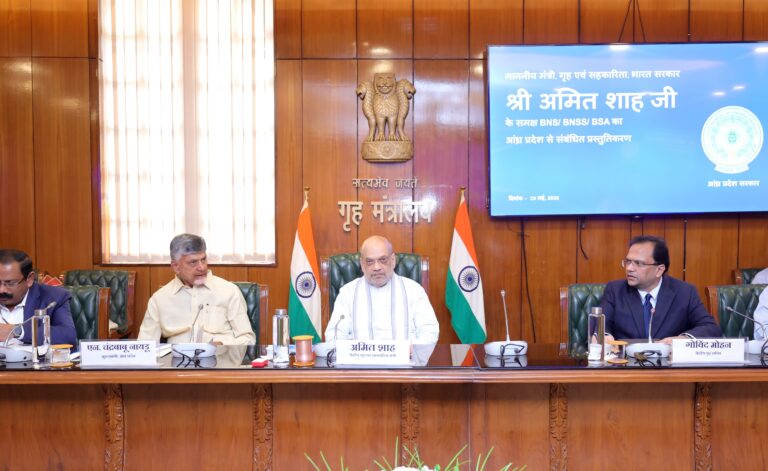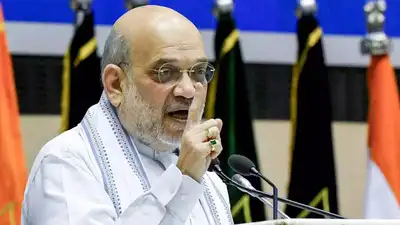Union Home Minister urges swift implementation of New Criminal Laws
Union Home Minister Amit Shah has emphasized the critical importance of fully implementing the new criminal laws across Andhra Pradesh to ensure effective protection of civil rights and to modernize the criminal justice system. During a high-level review meeting in New Delhi with Andhra Pradesh Chief Minister N. Chandrababu Naidu and senior officials, Shah highlighted that mere enactment of reforms is insufficient without thorough ground-level execution supported by robust monitoring and technology. The full rollout of these new laws—namely the Bharatiya Nyaya Sanhita (BNS), Bharatiya Nagarik Suraksha Sanhita (BNSS), and Bharatiya Sakshya Adhiniyam (BSA)—will reshape law enforcement and judicial processes in Andhra Pradesh and beyond.

Why does Amit Shah stress “full rollout” instead of partial or phased implementation?
Amit Shah made it clear that simply passing the new criminal laws at the legislative level does not automatically translate into strengthened civil rights or justice delivery. The reforms under BNS, BNSS, and BSA encompass comprehensive changes to police procedures, prosecution, courts, prisons, and forensic science. For citizens to truly benefit, these reforms must be active and fully functional at every level of law enforcement and judicial administration. Partial implementation risks inconsistencies, delays, and failure to protect rights, defeating the purpose of these landmark laws aimed at transparency and accountability.
The new criminal laws are designed to align India’s justice system with the spirit of the Constitution, ensuring citizens’ fundamental rights are upheld through timely and fair legal processes. By introducing strict timelines—such as filing charge sheets within 60 days and framing charges within 90 days—the laws aim to reduce delays and backlog. This directly protects individuals from prolonged detentions and enhances procedural justice. Furthermore, reforms in forensic procedures and police accountability further safeguard citizens against wrongful prosecution and abuse.
How does Amit Shah propose to ensure these laws are effectively implemented?
Shah advocated for a multi-tiered and technology-driven monitoring system. He outlined a structured review mechanism with defined responsibilities at various government levels: the Andhra Pradesh Chief Minister will review implementation monthly, the Chief Secretary fortnightly, and the Union Home Secretary alongside the Director General of Police (DGP) will conduct weekly progress checks. This tight schedule ensures ongoing accountability and rapid identification of gaps or delays in rollout.
Technology is pivotal to the Centre’s vision of a modern criminal justice system. Digitization of case files, forensic data management, and real-time progress tracking will be leveraged to monitor adherence to prescribed timelines and ensure transparency. Use of digital governance tools will help streamline coordination between police, prosecution, courts, and forensic departments, making the justice delivery process more efficient and less prone to human error or corruption.
What did Andhra Pradesh CM N. Chandrababu Naidu say about these reforms?
Chief Minister Naidu expressed strong appreciation for the Centre’s initiatives and recognized that Andhra Pradesh is playing a vital role as a pioneer state in implementing these new laws. He acknowledged that the reforms could bring transformative improvements in the criminal justice system, fostering trust in law enforcement and judicial fairness among citizens. Naidu reiterated his commitment to rigorous monitoring and fast-tracking the rollout across the state.
Participated in a review meeting chaired by the Hon’ble Union Home Minister & Minister of Cooperation, Shri @AmitShah Ji, in Delhi today to discuss the implementation of the three new criminal laws. pic.twitter.com/Y3H73QnPOs
— N Chandrababu Naidu (@ncbn) May 23, 2025
The meeting underscores the Narendra Modi government’s commitment to overhauling India’s criminal justice landscape by introducing accountability, timeliness, and scientific modernization. Andhra Pradesh’s experience will serve as a model for other states. These reforms align with the vision of a transparent, citizen-centric criminal justice system, strengthening law enforcement, prosecution, and forensic services, thereby improving overall public safety and civil rights protection.





















